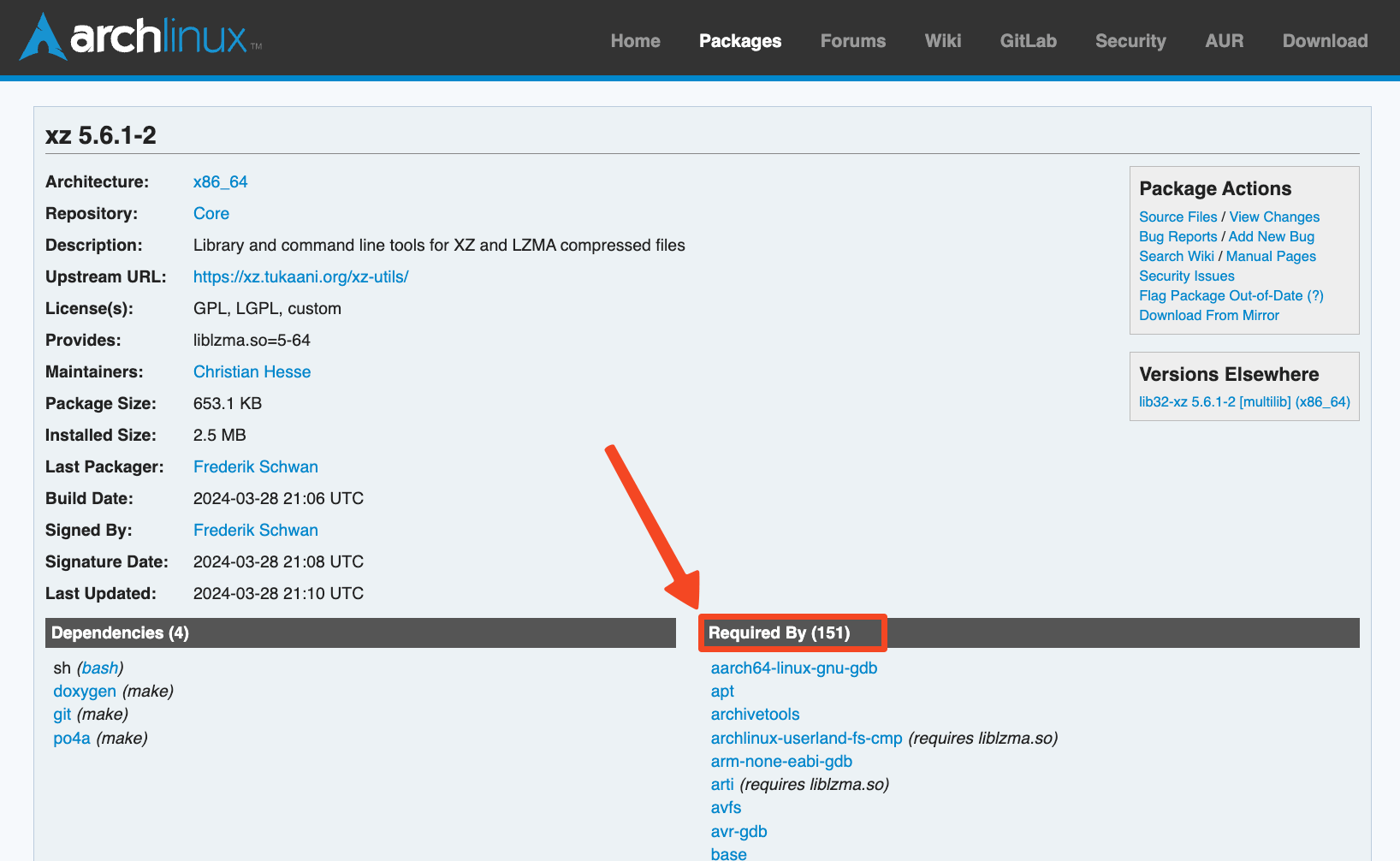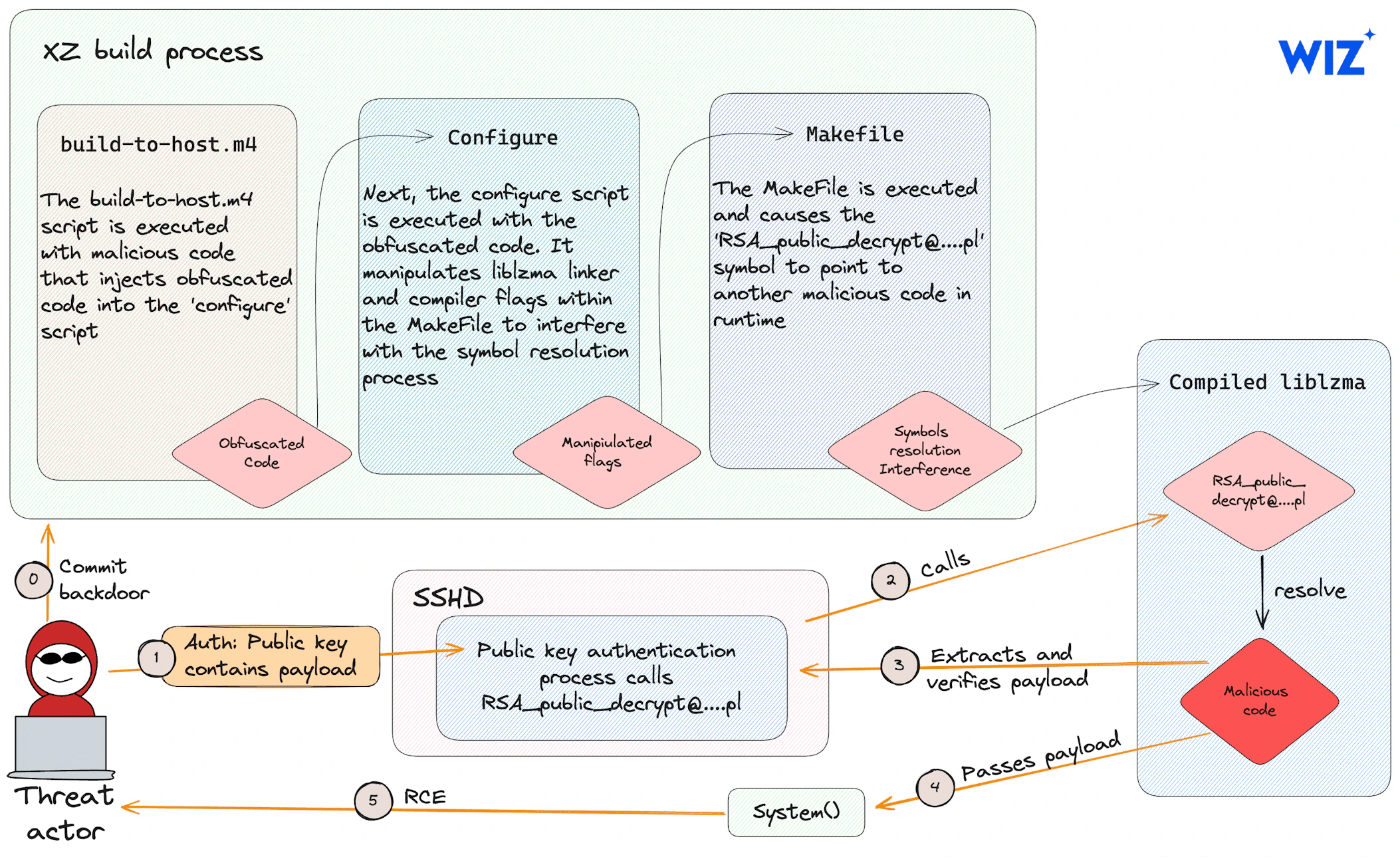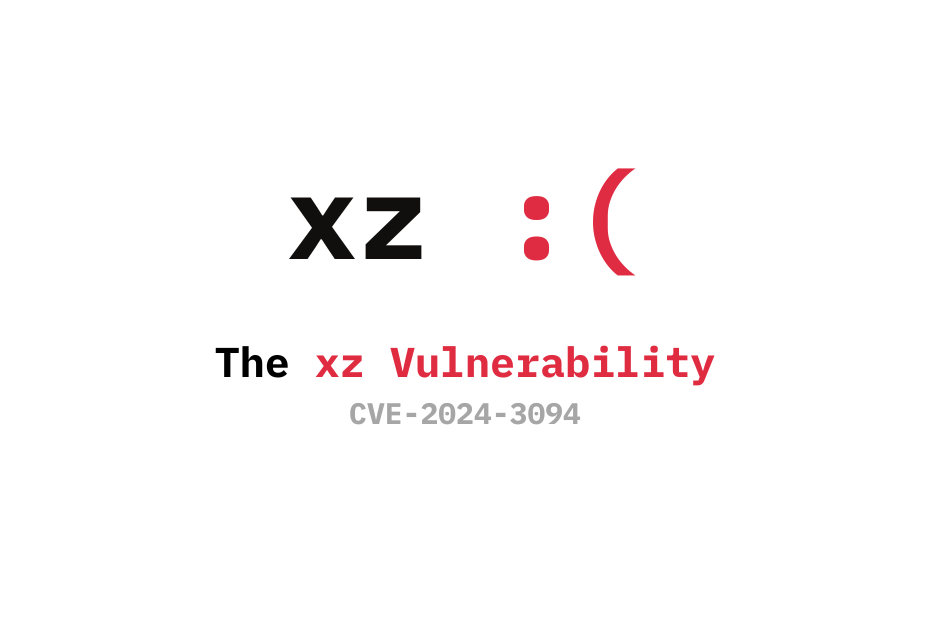| GitHub Repository | xz (Suspended) |
| Source Code | https://git.tukaani.org/?p=xz.git |
| Threat Actor | Jia Tan (GitHub) |
| CVE Number | CVE-2024-3094 (CVSS 10.0) |
| Vulnerability Type | Remote Code Execution |
| Attack Category | Social Engineering, Supply Chain Attack |
What does xz module do?
XZ Utils is a set of free and open-source data compression utilities that provide high compression ratios and fast decompression. It primarily uses the LZMA compression algorithm, which is an algorithm for lossless data compression.
Here are some common uses of XZ Utils:
- File Compression: Shrinks files and directories into .xz format, ideal for software distributions, backups, and archives.
- Packaging Software: Linux distros utilize XZ Utils to compress software packages, reducing bandwidth and storage requirements.
- Archiving: Creates compressed archives akin to tar or zip, simplifying storage and distribution of multiple files or directories.
- Backup Compression: Efficiently compresses backup files, particularly beneficial for large backups with limited storage space.
- Embedded Systems: Valued in embedded systems for its compactness and swift compression/decompression.
- Software Distribution: Developers streamline software distributions with XZ Utils, enhancing download speeds and reducing bandwidth usage.
Where it is being used?
xz module was used in different operating systems, a detailed list of the operating system using this module can be found on Repology/xz.

Version of xz in different OS

Dependency of xz on Arch Modules (https://archlinux.org/packages/core/x86_64/xz/)
Here the SBOMs are going to be helpful in understanding where the modules are being used and at what level the issue is propogated.
Brief about the vulnerability
Andres Freund
while performing micro-benching activity observed that sshd was consuming a large amount of CPU and taking more than usual time during login process. He also encountered numerous errors when using
Valgrind
tool for profiling and memory debugging and then
he emailed oss-security
about the backdoor in the xz module.

On March 29th, reports surfaced of malicious code discovered within XZ Utils, a widely-used package in major Linux distributions. This code enabled unauthorized SSH access. Detected in versions 5.6.0 and 5.6.1 released within the past month, the attack targeted OpenSSH servers. Remote attackers with a specific private key could execute arbitrary payloads through SSH, hijacking victim machines. Despite XZ Utils' trusted status, the attacker, posing as an OSS developer, evaded detection using highly obfuscated code.
Attack Timelines & Technical Details
Initially, the vulnerability appeared to be an authentication bypass, but after further analysis by the researchers , it was determined to be a remote code execution (RCE) issue.
In brief, it was a sneaky backdoor in the test files, the backdoor was not directly inserted into the source code of liblzma that is visible in version control systems or utilized by xz directly. Instead, it was hidden within binary test files in the xz compressed format. These files appeared benign and were theoretically part of the library’s test suite. A sophisticated method was employed where the backdoor was split into parts and concealed within two xz compressed files. These files were disguised as ordinary test files, evading detection from casual inspection or automated tools that scan for malicious patterns.
- This blog post by Evan Boehs explains the entire attack time in great detail. Ref - Everything I Know About the XZ Backdoor .
- The technical details breakdown is beautifully done by gynvael coldwind. Ref - xz/liblzma: Bash-stage Obfuscation Explained
The diagram by Wiz, gives a good eagle eye view on what happened and how a threat actor can use it to compromise victim’s systems - 
Detection & Defence
JFrog Research Team released an OSS tool to detect this vulnerability - cve-2024-3094-detector.sh
If you have some kind of CSPM in your organziation, they should also give you a comprehensive view of how your environment is affected.
As a product security person, you can estimate the risk by using different tools to create SBOMs, and consider other parameters that affects the expoitability and work towards downgrading the module and limiting the attack surface.
As a potential workaround for affected systems, where upgrading is not possible, consider adding the following line to /etc/environment:
echo "yolAbejyiejuvnup=Evjtgvsh5okmkAvj" | sudo tee -a /etc/environment
Afterward, ensure to restart both the SSH and systemd services. ( ref. - backdoor's kill switch )
The main defense to this right now, can be downgrading the version of xz to such as XZ Utils 5.4.6 Stable. (
ref.
)
The presence of extensive code, much of which may not even be under your control or managed by a third party, poses a significant challenge in defending against this type of attack. Unfortunately, in such cases, there isn’t much that can be done to effectively defend oneself. This attack could potentially affect anyone, as the actions taken were not overtly suspicious. So 😔 Yeah!
Some Other Bits
In the above sections, I have mentioned that SBOMs are going to be helpful in understanding the attack surface, but SBOMs alone cannot guarantee the exploitability of the vulnerability.
There are other factors in play, there are some pre-requisites that comes in the picture -
- The OS must be x86-64 Linux. (because of this
Homebrew
is not affected but worth
upgradingdowngrading the version.) - The
xzbuild process must be part of a Debian or RPM package build. This makes it more difficult to reproduce, as the backdoor won’t be installed when attempting to manually build thexzpackage.
If you are using a distroless image for hosting, chances are you are safe, but still downgrading the version is a good to perform task.
The term “SSH backdoor” is misleading in this context. OpenSSH doesn’t directly use xz, but Linux distribution maintainers linked xz into sshd during building, possibly for better integration with systemd. xz is so widely linked into packages that it’s challenging to determine the full scope of the potential impact of the backdoor.
There have been discussions regarding the mental health of the project maintainer, with perspectives on both sides of the issue. While I lean towards the viewpoint that security shouldn’t be linked to the maintainers' mental health. I would give you instance of both types of conversations -
- https://twitter.com/thegrugq/status/1774518694548566220
- https://twitter.com/robmen/status/1774067844785086775
The attacker also takes extra steps to get more involved in the OSS community and gain trust, hence there are other softwares where he contributed to -
- https://github.com/libarchive/libarchive/pull/1609
- https://github.com/google/oss-fuzz/pull/10667#pullrequestreview-1518981986
- … visit the Attacker’s Github Contribution History.
Another fun instance is when the attacker themselves help fix the issue in valgrind, that was caused because of their backdoor 🤣 ( ref. )
Looking at all these things, it looks like the efforts put in to perform this level of supply chain attack, might be some state sponsored act and it also sparks a discussion on open source security and contributions and doing it keeping sanity in mind.
More Reading?
- [SECURITY] [DSA 5649-1] xz-utils security update
- An Accidental Discovery of a Backdoor Likely Prevented Thousands of Infections
- Critical Backdoor Found in XZ Utils (CVE-2024-3094) Enables SSH Compromise
- Reported Supply Chain Compromise Affecting XZ Utils Data Compression Library, CVE-2024-3094
- Backdoor in XZ Utils allows RCE: everything you need to know
- XZ Utils backdoor by the Parent Organization (stating that the attacker only had access to the GitHub Repo and not the https://git.tukaani.org/?p=xz.git repository. )
- CVE-2024-3094 XZ Backdoor: All you need to know
- RedHat intimating Fedora Users about the vuln.
- e-zine for XZ Outbreak
- Hackernews Discussion on the Vuln.
There are more scenarios that are popping up on the extent this can be exploited and there are so many open questions out there. More information is going to be added in the blog as when things emerges.
Until then, Ciao!
P.S. - Thanks @anantshri for your inputs & review!
